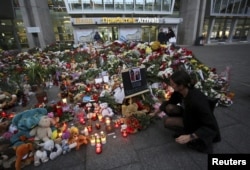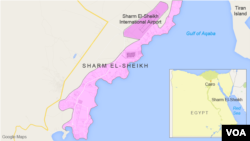U.S. and British officials are telling the media it is "highly possible" that a bomb brought down a Russian passenger jet over Egypt's Sinai Peninsula last week, killing all 224 people on board.
One U.S. official tells the Associated Press that intercepted communications point to the possibility that Islamic State was responsible.
Experts are examining the wreckage for any signs of terrorism, while some reports say forensic examinations have revealed shrapnel in some of the victims. The experts also have retrieved both black box flight recorders.
Islamic State has claimed responsibility for the disaster, but so far has not presented any firm evidence to back it up.
Various scenarios
Egyptian President Abdel Fattah el-Sisi has dismissed Islamic State's claim as "propaganda" and an effort to damage Egyptian security and stability.
David Schenker, a Middle East expert with the Washington Institute for Near east Policy, told VOA "it would not come as much of a surprise" if Islamic State is responsible for destroying the plane.
Schenker said the extremist group has an interest in attacking both Egypt and Russia and that blowing up a soft target like a civilian airliner would send a powerful signal.
In Britain, Prime Minister David Cameron's office issued a statement saying, "While the investigation is still ongoing we cannot say categorically why the Russian jet crashed. But as more information has come to light we have become concerned that the plane may well have been brought down by an explosive device."
The Metrojet Airbus took off from the Egyptian resort of Sharm El-Sheikh for St. Petersburg, Russia, Saturday and shortly thereafter disappeared from radar.
A team of British aviation experts went to the Sharm-El-Sheikh airport to assess security there before any British flights will be allowed to leave the region.
White House spokesman Josh Earnest said Wednesday no U.S. air carriers regularly operate out of the Sinai Peninsula. He noted that U.S. air safety experts warned commercial airlines several months ago that they were "at potential risk associated with extremist activity" if they flew over the Sinai.
Several airlines, including Air France, Lufthansa, Dubai-based Emirates and Qatar Airways have stopped flying over the Sinai Peninsula for safety reasons.
Authorities say they have not found any evidence of a missile attack at the time the jetliner crashed Saturday. That leaves open the possibility of an explosion aboard the flight, either from a bomb or a mechanical failure.
A U.S. military satellite detected a heat flash at the time the jetliner crashed over the Sinai. But no missile launch or missile engine burn was detected.
Experts told U.S. media outlets the heat flash could point to a catastrophic event aboard the aircraft, such as an explosion, fire, or even just the aircraft parts hitting the ground.





